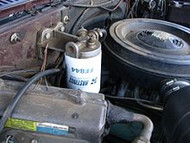How the Fuel Filter Works
13th Sep 2017

Cars, trucks and other automobiles powered by combustion engines typically contain a fuel filter. Consisting of a cartridge with a paper material, it's designed to catch dust, dirt, rust and other debris, preventing impurities such as these from reaching the engine.
It's not uncommon for steel gas tanks to develop rust. When the gas tank is completely closed and properly maintained, rust won't happen. However, a leaking gas cap or watered-down gas can cause moisture to accumulate within the tank. And when moisture reaches the steel metal, oxidation and subsequent rusting occurs. This can prove disastrous to the engine if the rust particles are not properly filtered, causing the fuel injectors and pumps to fail.
Normally, the fuel filter is connected to the fuel line, where you can remove and replace the filter. For diesel engines, however, the fuel filter may feature a bowl-like design that catches water at the bottom. This is because diesel fuel contains more water, and that water must be filtered before it reaches the engine.
How Often Do I Need to Change My Fuel Filter?
You might be wondering how often you need to replace the fuel filter in your car. Well, like most components, it varies depending on the car. Some automakers recommend changing the fuel filter every 20,000 miles, whereas others recommend changing it every 40,000 miles. Such variations can be confusing, especially considering that different auto shops tell you different changing intervals as well.
Additionally, some newer vehicles are designed with lifetime fuel filters, meaning they rarely need replacing. With that said, there's no harm in replacing a fuel filter, even if it's a lifetime filter. Ultimately, though, you should refer to your vehicle's owner manual for more information on how and when to change the fuel filter. Here you'll find specific guidelines by the automaker for your make and model vehicle.
Other Filters You Should Be Aware of
Of course, there are other filters used in automobiles, including oil and air filters. The former is designed to filter dirt and debris from oil, whereas the latter filters dirt and debris from the air flowing into the cabin. Like fuel filters, air filters typically last a long time. Oil filters, on the other hand, should typically be replaced every other time that you change your engine oil, which translates into about once every 8,000 to 10,000 miles.




